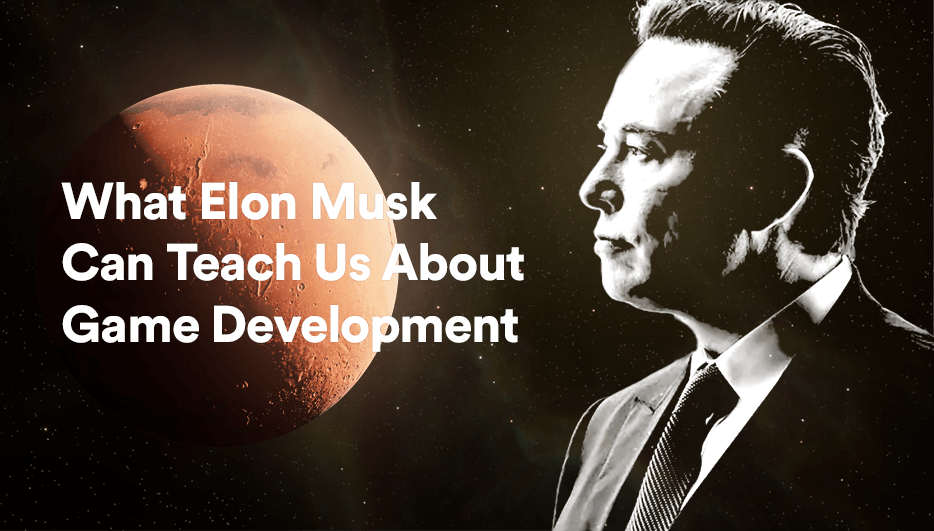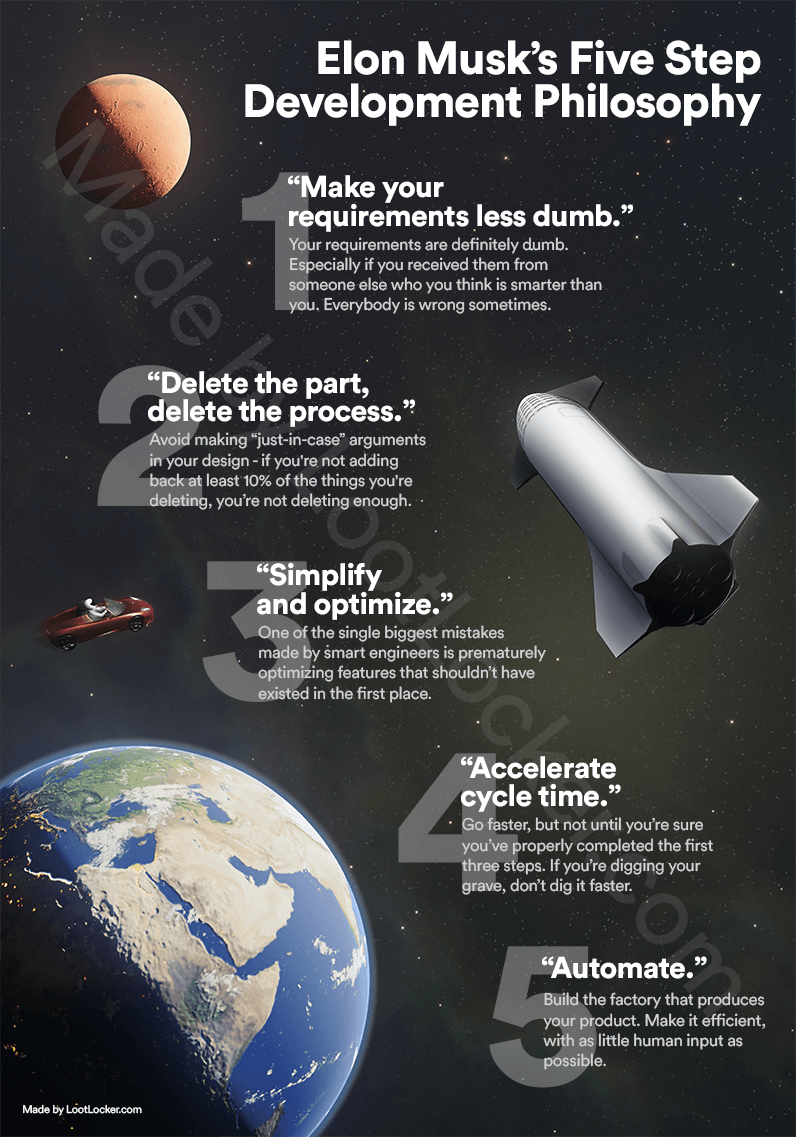What Elon Musk Can Teach Us About Game Development

- Intro
- 1. Elon says: “Make your requirements less dumb.”
- 2. Elon says: “Delete the part, delete the process.”
- 3. Elon says: “Simplify and optimize.”
- 4. Elon says: “Accelerate cycle time.”
- 5. Elon says: “Automate.”
- Make LootLocker Your Rocket Fuel
Elon Musk. Tech entrepreneur, philanthropist, and Twitter memelord. Oh, and richest human on the planet. Last year he took YouTuber Everyday Astronaut on a tour of the Starbase rocket factory in Texas and again in his latest video looking specifically at SpaceX's Raptor 2 engine. In both interview he talked about a five-step first principal design process he uses for his revolutionary orbital rockets and to achieve his oh-so-simple ambition to make humanity “a multi-planetary species”. As game developers, we might not be aiming quite so high (both literally and metaphorically). But there is still a lot we can learn from Elon’s process and apply to our everyday work.
Reason from first principles rather than by analogy
Central to Elon's development philosophy is first principles logic. What this means is to approach a problem without assumptions. Literally breaking down the problem into fundamental truths before carefully rebuilding the problem, reasoning up from what we're sure is true, and questioning each statement that it comprises. Compare this to what we usually do, reasoning by analogy. As humans we tend to look at the world accepting how things are done because it's similar to something else previously done or simply what people are currently doing.
Before Elon started Tesla, no one thought electric cars could be viable because battery packs were too expensive. "That's the way it's always been", they said. Elon applied his first principles logic to this and found that the components within a battery pack were a lot cheaper individually, they just needed to be combined in a cost effective way. By applying the first principles to this challenge he was facing, Elon was able to bring the cost of battery manufacturing down low enough to make Tesla a successful business.
Let's apply this way of thinking to game development. Here are our thoughts on some of the ways Elon’s five step (first principles) development philosophy can help you in your game development journey.
1. Elon says: “Make your requirements less dumb.”
"Your requirements are definitely dumb." Elon’s point here is that sometimes we don’t question requirements that we give ourselves, or someone else gives us, especially if we think they’re smarter than us. But everybody’s wrong sometimes, so sometimes these requirements should be questioned.
How does that apply to game development?
Game design doesn’t have any rules. That’s one of the reasons we love it. So just because another successful game did (or didn’t) do something, doesn’t mean you have to stick to the same formula. This also applies to feedback – just because a player, publisher, or another game developer said something won’t work, you shouldn’t immediately take their word as gospel. Sometimes you need to stick to your guns and make that crazy farming simulator roguelike that you’ve been dreaming of.
2. Elon says: “Delete the part, delete the process.”
When designing something that hasn’t been made before, it’s easy to include parts, process steps, or features in your design just in case - negatively affecting performance, weight, cost or other factors that are key to your success. So to be an effective designer, Elon believes that we need to ruthlessly remove things from the design until we’re forced to start adding them back in just to get the product to work again.
It’s very easy to make “just-in-case” arguments for, well, for anything really. But Elon says that if you’re not having to add stuff back in for at least 10% of the time during your design process, you’re not deleting enough in the first place. Seek out the literal minimum viable product, and then add stuff back into the design.
How does that apply to game development?
In order to find what’s truly fun about your game, simplify, simplify, then simplify some more. Strip your game’s non-essential features back to its basic structure – even to the point that it doesn’t work anymore. Then you can start adding things back in until you’ve created something fun and engaging. At that point you’ll have a true MVP to start sharing and building upon based on feedback..
3. Elon says: “Simplify and optimize.”
According to Elon, only once you've completed steps one and two should you start trying to optimize. He says, "Possibly the most common error of a smart engineer is to optimize a thing that should not exist." Also known as premature optimization, it’s all about making the best use of your time by only fine-tuning things you know are going to make the final cut.
How does that apply to game development?
This one’s pretty self explanatory. Don’t optimize your game before you’ve found the fun and finalized its features. Like spending loads of time getting a character’s facial expressions just right, then realizing your story means they’re actually wearing a mask for the whole game.
4. Elon says: “Accelerate cycle time.”
In other words – go faster. But not until you’re absolutely sure you’ve finished the previous three steps, and you’ve done them right. Elon makes it pretty clear: “If you’re digging your grave, don’t dig it faster - stop digging your grave!”
How does that apply to game development?
Get your game out there as soon as you can. Then get player feedback so you aren’t wasting time building something no one wants to play. Once you know what people do and don’t like about it, you can start iterating the game development pipeline to speed up development, produce content faster, and release updates more quickly.
5. Elon says: “Automate.”
This is another one that’s pretty self-explanatory. The more you can automate processes, the faster you can improve your success. Once you've reached this final step, build the machine that can speed up the development of your product.
How does that apply to game development?
If you’ve got this far, you know you have a fun game that people want to play. But you need to make sure they keep wanting to play it, and find ways to create a retention spinwheel. So build systems for continued play – like user-generated content, progression (battle passes), and other social elements. Try to get the community to help make content so everything doesn’t always have to rely on your own creativity.
Thankfully our plug-and-play cross-platform backend can save you lots of time in this area. Because we provide these features out of the box, you won’t have to build them yourself from scratch.
Make LootLocker Your Rocket Fuel
Spend your time following Elon’s steps and let us look after the small stuff – we can help with everything from currencies to cosmetics, and UGC to DLC. More specifically, as you approach step 4 and 5, feel free to get in touch to find out more.
Finally, since we're fans of Elon's design process, we've made an infographic out of these five steps. Better yet, we've made it a full sized poster that you can order and hang on your wall.
